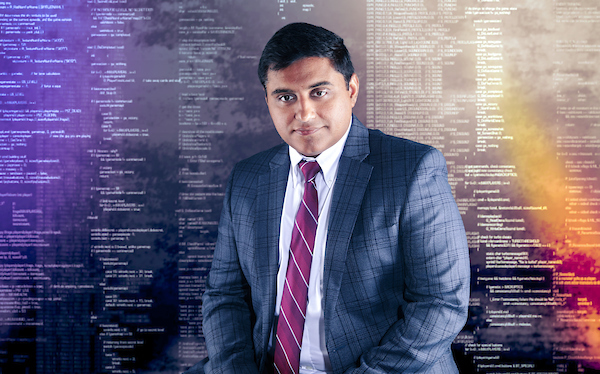COSMOS’ COVID-19 Misinformation Research Featured as Army Success Story

Research on COVID-19 misinformation conducted by Dr. Nitin Agarwal, Maulden-Entergy Chair and Distinguished Professor of Information Science and founding director of the Collaboratorium for Social Media and Online Behavioral Studies (COSMOS) Research Center at the University of Arkansas at Little Rock, has been highlighted as a success story by the U.S. Army Research Office.
The story, “Developing Research Infrastructure to Strengthen Socio-Cognitive Security for Combating Misinformation and Deviant Collective Behavior,” was featured in the U.S. Army Research Office’s year-in-review magazine.
In this research, funded and recognized by the ARO, Dr. Agarwal and his team at the COSMOS research center applied their expertise to study COVID-19–related cross-media misinformation campaigns and scams. They put the research in practice by deploying the research-driven solution in collaboration with Arkansas Attorney General’s office to raise awareness and combat misinformation and scams in the state of Arkansas.
This groundbreaking work has garnered recognition from the World Health Organization (WHO), acknowledging its potential as a critical technological innovation in the fight against COVID-19. COSMOS worked closely with the Arkansas Attorney General’s office to understand their need during an intensive barrage of COVID-19–related scams and misinformation and delivered effectively for proactive policymaking. Findings from this collaboration were published in the book entitled “Coronavirus and Disinformation – A Whole of Society Perspective” under the auspices of NATO Research and Technology Group (RTG HFM-293).
“Our inclusion in the U.S. Army Research Office’s year-in-review magazine marks not just a milestone for our team but a beacon of commitment to truth and building community resilience against the tide of misinformation by working closely with our policymakers,” Agarwal said. “As the digital landscape evolves, so does our dedication to fortifying our socio-cognitive security. The journey continues, and each discovery strengthens the foundation of our collective pursuit.”
The funding and recognition of the Army Research Office not only speaks to the importance of such research pursuits, but also to how COSMOS has taken academic theories, such as those on deviant collective behaviors, and applied them with computing algorithms in such a way that government and military officials can now look to such research for practical solutions.
“This demonstrates COSMOS’s ability to bridge science, society, and policy-making through research, technology, and innovation,” Agarwal said. “We demonstrated how modern coordinated cognitive threats can be modeled, and its consequences can be mitigated through proactive policy-making supported by research-driven solutions. The recognition puts us at par with research centers and labs at top-tier institutions across the nation working to advance foundational research competencies to enable crucial future Army technologies and capabilities.”
